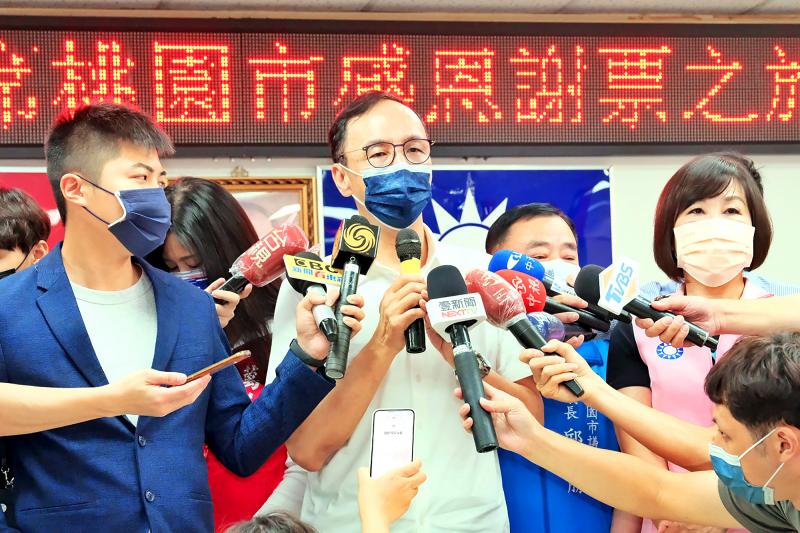Chinese Nationalist Party (KMT) chairman-elect Eric Chu (朱立倫) yesterday said he hopes the KMT and the Chinese Communist Party (CCP) will seek common ground and respect differences on the basis of the “1992 consensus” and opposition to Taiwanese independence.
Chu made the remarks in response to a congratulatory letter from Chinese President Xi Jinping (習近平) written in his capacity as general secretary of the CCP Central Committee on the occasion of Chu’s election as KMT chairman on Saturday.
In the recent past, the KMT and the CCP had good interactions, bolstered cooperation and promoted the peaceful development of cross-strait relations based on the common political basis of adhering to the “1992 consensus” and opposing Taiwanese independence, Xi said in his letter, according to a copy released by the KMT.

Photo: CNA
“At present, the situation in the Taiwan Strait is complex and grim,” Xi wrote, calling for unity among “all Zhonghua (中華) sons and daughters” and expressing the hope that the two parties will work together to “seek peace for the Taiwan Strait, seek reunification for the country and seek rejuvenation for the nation.”
For more than 30 years, there had been good progress in exchanges and cooperation at all levels of cross-strait relations due to the continued efforts of the KMT and the CCP, Chu said in his response, a copy provided by the KMT showed.
However, in the past few years, under the Democratic Progressive Party’s (DPP) administration, a “desinicization” and “anti-China” policy has been adopted, changing the “status quo” across the Strait, and resulting in a precarious situation and trepidation among people on both sides, he wrote.
Chu said he hopes that the KMT and the CCP will, on the basis of the “1992 consensus” and opposition to Taiwanese independence, seek common ground and respect differences, increase mutual trust, and bolster exchanges and cooperation so that the peaceful development of cross-strait relations can continue.
Chu is expected to be sworn in as KMT chairman on the same day as the party’s National Congress, which is scheduled to convene on Oct. 30, according to the KMT’s charter.
A two-term New Taipei City mayor, Chu won Saturday’s chairperson election with 85,164, or 45.78 percent, of the 186,018 valid votes cast by eligible KMT members, results released by the party’s Central Election Supervision Committee showed.
In January 2015, Chu was elected KMT chairman in an unopposed by-election, but he resigned one year later over the party’s losses in the Jan. 16, 2016, presidential and legislative elections, in which he was the KMT’s presidential candidate.
The “1992 consensus,” a term former Mainland Affairs Council chairman Su Chi (蘇起) in 2006 admitted making up in 2000, refers to a tacit understanding between the KMT and the Chinese government that both sides of the Taiwan Strait acknowledge there is “one China,” with each side having its own interpretation of what “China” means.

CHAOS: Iranians took to the streets playing celebratory music after reports of Khamenei’s death on Saturday, while mourners also gathered in Tehran yesterday Iranian Supreme Leader Ayatollah Ali Khamenei was killed in a major attack on Iran launched by Israel and the US, throwing the future of the Islamic republic into doubt and raising the risk of regional instability. Iranian state television and the state-run IRNA news agency announced the 86-year-old’s death early yesterday. US President Donald Trump said it gave Iranians their “greatest chance” to “take back” their country. The announcements came after a joint US and Israeli aerial bombardment that targeted Iranian military and governmental sites. Trump said the “heavy and pinpoint bombing” would continue through the week or as long

TRUST: The KMT said it respected the US’ timing and considerations, and hoped it would continue to honor its commitments to helping Taiwan bolster its defenses and deterrence US President Donald Trump is delaying a multibillion-dollar arms sale to Taiwan to ensure his visit to Beijing is successful, a New York Times report said. The weapons sales package has stalled in the US Department of State, the report said, citing US officials it did not identify. The White House has told agencies not to push forward ahead of Trump’s meeting with Chinese President Xi Jinping (習近平), it said. The two last month held a phone call to discuss trade and geopolitical flashpoints ahead of the summit. Xi raised the Taiwan issue and urged the US to handle arms sales to

State-run CPC Corp, Taiwan (CPC, 台灣中油) yesterday said that it had confirmed on Saturday night with its liquefied natural gas (LNG) and crude oil suppliers that shipments are proceeding as scheduled and that domestic supplies remain unaffected. The CPC yesterday announced the gasoline and diesel prices will rise by NT$0.2 and NT$0.4 per liter, respectively, starting Monday, citing Middle East tensions and blizzards in the eastern United States. CPC also iterated it has been reducing the proportion of crude oil imports from the Middle East and diversifying its supply sources in the past few years in response to geopolitical risks, expanding

OTHER OPTIONS: Given possible US intervention and Taiwanese counterattacks, China might opt to blockade Taiwan or take its outlying islands instead of an all-out invasion A US think tank has urged Taiwan to adopt a “hellscape” strategy that would flood the Taiwan Strait with drones and other uncrewed systems to deter invasion by China. In its report, Hellscape for Taiwan, published on Thursday, the Center for a New American Security said Taipei’s asymmetric defense approach — often described as a “porcupine strategy” — needs to evolve to keep pace with the growing capabilities of the Chinese People’s Liberation Army. The “hellscape” strategy involves saturating the air and waters around Taiwan with thousands of drones and other platforms capable of striking invading forces from multiple domains at once. Long-range